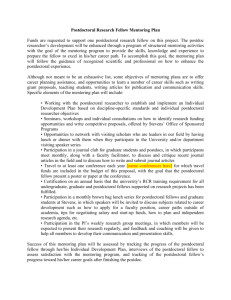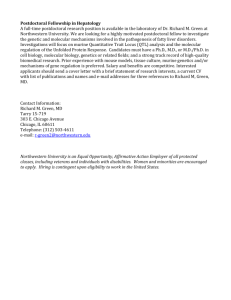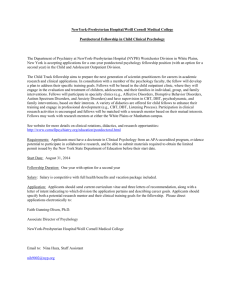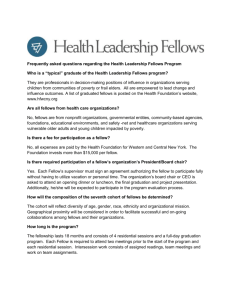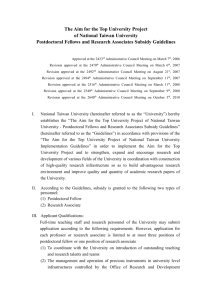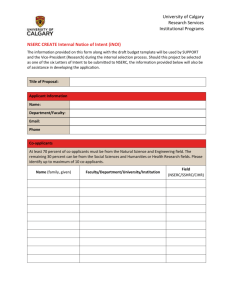Revised Policy for Research Postdoctoral Fellows
advertisement
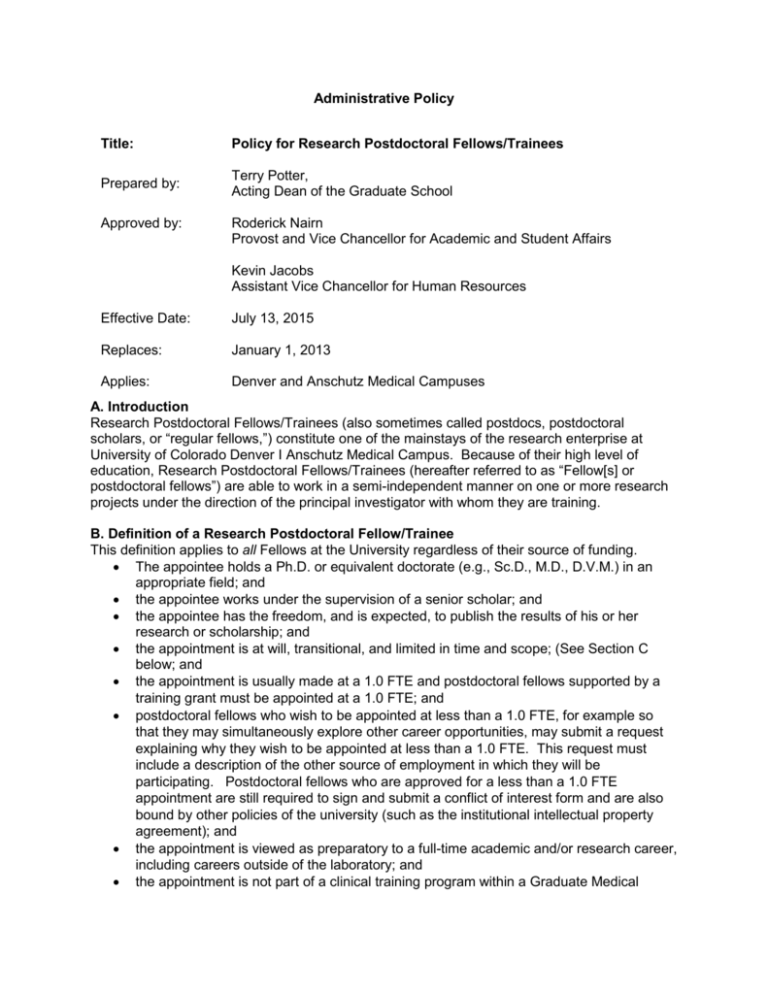
Administrative Policy Title: Policy for Research Postdoctoral Fellows/Trainees Prepared by: Terry Potter, Acting Dean of the Graduate School Approved by: Roderick Nairn Provost and Vice Chancellor for Academic and Student Affairs Kevin Jacobs Assistant Vice Chancellor for Human Resources Effective Date: July 13, 2015 Replaces: January 1, 2013 Applies: Denver and Anschutz Medical Campuses A. Introduction Research Postdoctoral Fellows/Trainees (also sometimes called postdocs, postdoctoral scholars, or “regular fellows,”) constitute one of the mainstays of the research enterprise at University of Colorado Denver I Anschutz Medical Campus. Because of their high level of education, Research Postdoctoral Fellows/Trainees (hereafter referred to as “Fellow[s] or postdoctoral fellows”) are able to work in a semi-independent manner on one or more research projects under the direction of the principal investigator with whom they are training. B. Definition of a Research Postdoctoral Fellow/Trainee This definition applies to all Fellows at the University regardless of their source of funding. The appointee holds a Ph.D. or equivalent doctorate (e.g., Sc.D., M.D., D.V.M.) in an appropriate field; and the appointee works under the supervision of a senior scholar; and the appointee has the freedom, and is expected, to publish the results of his or her research or scholarship; and the appointment is at will, transitional, and limited in time and scope; (See Section C below; and the appointment is usually made at a 1.0 FTE and postdoctoral fellows supported by a training grant must be appointed at a 1.0 FTE; and postdoctoral fellows who wish to be appointed at less than a 1.0 FTE, for example so that they may simultaneously explore other career opportunities, may submit a request explaining why they wish to be appointed at less than a 1.0 FTE. This request must include a description of the other source of employment in which they will be participating. Postdoctoral fellows who are approved for a less than a 1.0 FTE appointment are still required to sign and submit a conflict of interest form and are also bound by other policies of the university (such as the institutional intellectual property agreement); and the appointment is viewed as preparatory to a full-time academic and/or research career, including careers outside of the laboratory; and the appointment is not part of a clinical training program within a Graduate Medical Education program at the University of Colorado Anschutz Medical Campus; and given that the university considers these positions to be traineeships in highly specialized areas of study, and that these traineeships are required in order to realize full employment in the field, these positions will be defined as internships equivalent to the GME Residency program only for purposes of completing requests for student loan deferments. C. Term Limits for Research Postdoctoral Fellow/Trainee Appointments A research postdoctoral fellow should have a maximum of six years of postdoctoral experience at the University. Time spent as a postdoctoral fellow at other institutions is not included in the six-year term limit. Individuals who are retained at the University beyond this six-year term limit should be placed into a regular job classification, such as Instructor, Research Associate, Senior Research Associate, or Assistant Professor. A research postdoctoral fellow and his/her faculty mentor may petition the Dean of the School in which the faculty member has their primary appointment for an extension to these terms. D. Minimum Salary at Initial Appointment The suggested initial minimum stipend/salary for postdoctoral fellows is that defined in the current NIH training grant guidelines. http://grants.nih.gov/training/nrsa.htm All fulltime postdoctoral fellows must receive a stipend either equal to, or above, the NIH guidelines for a postdoctoral fellow with no previous experience. Exceptions to this policy may be granted by the Dean of the School in which the faculty member has their primary appointment. This policy covers the salary requirements for all new hires as of July 2015. It is not the intent of the policy to enable decreases in the salary of individuals currently appointed as a postdoctoral fellow. In disciplines not funded by federal agencies, the Dean of the appropriate school or college will establish appropriate salary guidelines. E. Grievance and Evaluation Processes Each School and College should establish their own procedures for handling grievances involving professionalism issues, salary, benefits and work conditions. Clear directions for how to appeal decisions will be developed by the School/College. The final decision rests with the Dean of the School/College in which the fellow is employed. Each postdoctoral fellow must receive an annual evaluation. This process can be completed according to the procedures adopted by the School/College into which the postdoctoral fellow is hired. In addition, for Schools and Colleges that would prefer that the Graduate School facilitate the evaluation of postdoctoral fellows, the Graduate School will provide an on-line application so that faculty can complete an annual evaluation of each of their postdoctoral fellows. The Graduate School will also provide the Department chairperson, or other direct supervisor of faculty who have postdoctoral fellows in their lab, an indication that this report was completed by the Faculty and seen by the fellow. F. Uniform Benefits All research Postdoctoral Fellows/Trainees employed 50% or more receive the same benefits, regardless of the source of their support. See the Benefits Eligibility Matrix at the Employment Services website. Benefits include the standard employee offerings and are subject to the same eligibility and usage requirements as other employment classifications. This includes: group medical and dental insurance, life and AD&D insurance, short and long-term disability, workers’ compensation, unemployment compensation, Flexible Spending Accounts, and COBRA upon termination. Leave benefits for fellows/trainees employed 50% or more include: o 12 working days of vacation and 12 working days of sick leave per fiscal year for a total of 24 working days (or 192 hours) for full-time positions per fiscal year. o Accrued (unused) leave is carried forward year to year during the term of employment, but with no payout at termination. o Maximum accrual is capped at 44 working days (or 352 hours) of combined sick and vacation leave. o Accrual and usage follows the prevailing University practices used for other employee classifications. Hours shall be accrued each month at the rate of one day (or 8 hours) each for sick leave and vacation leave, and available for use at the beginning of the next month. Prorated leave shall be accrued for partial month hires and for appointment of at least 50 % but less than 100%. o Postdoctoral Fellows are eligible for Family Medical Leave per the standard criteria used for other campus faculty positions. o Postdoctoral Fellows are afforded leave in accord with University policy for all employees for holidays, military duty, bereavement, and jury duty. o Should University, State, or federally-supported grant policies change, requiring equitable change in the number of leave days/hours afforded those in postdoctoral fellow positions, the changes will be adjusted accordingly and become effective without requiring formal amendment to this written policy. G Periodic Review The Offices of the Provost and Human Resources will review this policy, and how it is being administered, on an ad hoc, as needed, basis, but no less frequently than every three years.
